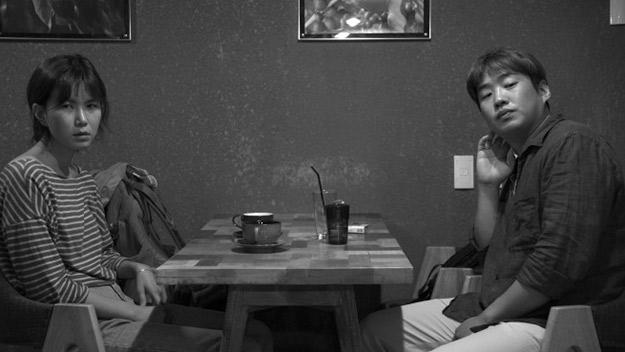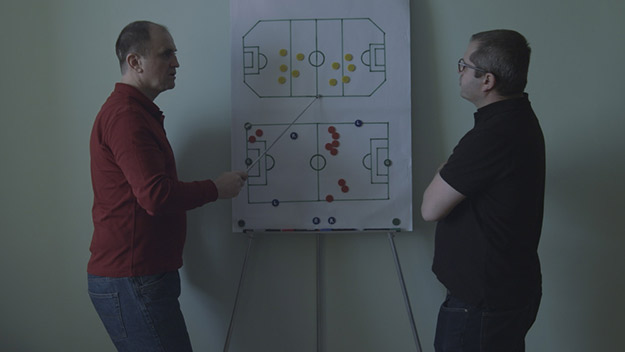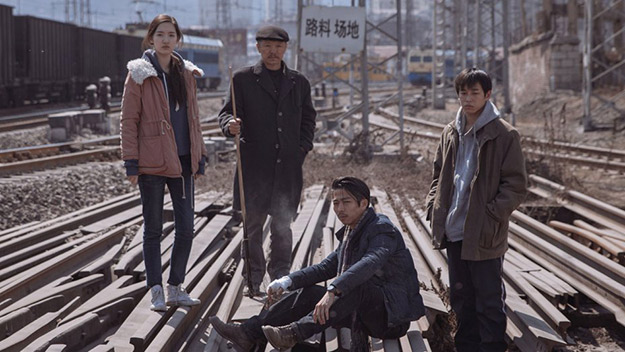Festivals: Berlin 2018

Grass
“It’s a down year”: some version of this sentiment was expressed early and often at this year’s Berlinale, the festival’s 68th edition. The Berlinale’s competition boasted a handful of marquee names sure to arouse some interest on the part of festival-goers—new films by Wes Anderson (whose Isle of Dogs opened the festival), Steven Soderbergh (whose baffling Unsane screened “out of competition” despite being included in the selection), and Lav Diaz (who won the Golden Bear in 2016 with A Lullaby to the Sorrowful Mystery)—yet it nevertheless failed to drum up much excitement, with more or less middling word-of-mouth on all but Christian Petzold’s typically excellent, time-out-of-joint gem, Transit. Insofar as a major festival has some sort of obligation to spotlight the most intrepid, essential new films the world over, the competition didn’t exactly suggest a can’t-miss indication of the future of the medium. Luckily, the festival also includes the Arsenal Institute for Film and Video Art’s perennially vital Forum, a fixture at the Berlinale since 1971. The Forum, 44 films in all this year, is something like a festival unto itself, a robust assortment of new works by giants of world cinema and auspicious neophytes, up-and-comers, and slept-on veterans. One could easily stick to it exclusively and receive a more than serviceable look at the state of global cinema. There was seldom need to stray from it at this year’s Berlinale.
Last year, Hong Sangsoo’s campaign for world domination kicked off in the Berlinale’s competition with On the Beach at Night Alone. This year, he returned to the Forum with an endlessly curious exercise, the gnomically titled Grass. Roughly an hour long and once again working in black-and-white (as with 2017’s Cannes entry The Day After and 2011’s The Day He Arrives), Grass finds Hong setting up a fascinating narrative problem for himself—how to tell a story whose elements are culled almost entirely from the eavesdropping of a café patron (Kim Minhee, winner of the 2017 Silver Bear for Best Actress)—and the pleasures and poignance result from watching one of contemporary cinema’s masters solving it as only he can. Kim plays Areum (a name shared by her character from The Day After), and she spends much of the film sitting in the café’s window, typing something out on a laptop (though she’s adamant that she’s not a writer). She observes three dramatic situations unfolding in her general vicinity: a young woman bound for Europe who meets a male friend, only for their conversation to erupt in vitriolic accusations when the subject of a recently deceased friend arises; a washed-up actor trying to sweet-talk his way into staying with an old friend; and finally, a rather narcissistic actor/director (Jung Jinyoung, Hong’s onscreen surrogate in last year’s Claire’s Camera) trying to rope a young writer into his next screenwriting project. These dialogues play out largely in Hongian long-take two-shots with an occasional zoom punctuating the discursive action, and, yes, the actor/director figure ultimately manages to smuggle in some soju. (He says the never-seen café owner is cool with it, and I suppose we’ll just have to take him at his word.) Areum hardly interacts with the other patrons but for one particularly awkward misreading of signals, though she’s bailed out by the appearance of her brother, who has come to fetch her for a dinner with him and his girlfriend that itself turns sour when the couple casually discusses marriage and somehow pisses Areum off. She returns to the café to continue her mysterious work, with all the previously mentioned players still present, like a never-ending theatrical performance that just keeps going whether she’s there or not. As is usual for Hong, the ostensible formal simplicity and raw emotions of Grass deliberately run interference on our perception of the rather complicated narrative dance being undertaken, an episodic structure that suggests its multiple threads are taking shape simultaneously while also slyly undermining its own relationship with temporality. A chronology is suggested, but do we believe in it? Or is the café some kind of Sartrean waiting room, its residents sitting, talking, fighting, escaping from their lives outside?
The idea of withdrawing from the world receives a more tender yet melancholic treatment in Ted Fendt’s Philadelphia-set Classical Period, which is nothing short of delightfully didactic. Jettisoning the narrative contrivances of his debut feature, Short Stay (which had its world premiere in the 2016 Forum), while retaining much of its understated style, the film’s narrative concerns the intellectual life of a young man, Cal (Cal Engime), about whom we know little apart from that he’s a savant of another order and that he’s a member of a small reading group working their way through Dante’s Divine Comedy. What distinguishes Cal from the non-professional leading men in Fendt’s previous feature and his short films is that he has carved out a social space in which he can obtain something resembling charismatic authority: Classical Period is dense with talk, and the bulk of it assumes the form of Cal lecturing his fellow reading group members on arcane theological, architectural, and literary history. The triumph of Classical Period resides largely in how engrossing, compelling, and even entertaining these history lessons are (Fendt, a Straub-Huillet scholar himself, doubtlessly had their History Lessons on his mind): the sheer pleasure of watching the film resides in listening to uninterrupted intelligent discussion, something we seldom see nor hear in cinema. The film’s delicate, naturally lit 16mm imagery alternates between Wiseman-esque documentation (when we observe the reading group meeting) and something resembling the intimate film-poetry of Robert Beavers (when we see Cal at home alone, reading), and Fendt’s preference for direct sound conjures an arresting feeling of place. But Fendt is all too aware of the social limits of the scholarly monomania on display, and the counterpoint to its own celebration of erudite conversation is provided by way of Evelyn (Evelyn Emile), another member of the group whom Cal runs into a few times outside of their meetings. Interested in poetry and the thought of Simone Weil, Evelyn is as absorbed in her own intellectual pursuits as Cal is, but in one particularly funny and slightly heartbreaking scene, she revolts against the film’s implication that this is all there is to life. (Labor and drudgery had figured prominently in Fendt’s previous films; here, his characters’ jobs aren’t specified.) Her displeasure with a thoughtless question from an overbearing expert on local architecture prompts her to slash at the fabric of Cal’s carefully curated existence, raising the question as to how long we can use our obsessions to shield ourselves from the potentially traumatic experience of engaging with others outside of our comfort zones. Classical Period is relentlessly comical and even, dare I say it, educational, but it also boldly and self-critically calls attention to the air of tragedy about its flight from the indignities of everyday life into the gilded palace of knowledge.

Infinite Football
From distancing oneself from the world to imagining a better one: Corneliu Porumboiu’s latest, Infinite Football, is his second recent documentary (after 2014’s The Second Game) to use the beautiful game as a prism through which to view political reality. The film’s subject, Laurentiu Ginghina, is a character straight out of one of Porumboiu’s metaphysical comedies, a government bureaucrat whose career on the pitch (and his ability to pass the requisite physical to get into forestry school) was cut short in 1986 when a brutal slide tackle fractured his fibula. Ginghina now spends his time rethinking the sport in terms of player safety, having determined that his injury had less to do with an opposing player’s reckless aggression than with the rules of the game itself. His proposal for reforming the sport (without giving too much away, let’s just say it involves drastic changes to the playing field and considerable restrictions on where players can go on it) is hilariously radical, and we can’t help but view the endgame he’s pursuing as being a bit ridiculous. (Porumboiu’s onscreen presence as a deadpan interlocutor dials up the absurdity of some of the prescriptions being kicked around.) But Porumboiu is hardly taking the piss out of a naïve man’s dream to revolutionize the most popular sport on the planet. Late in the film, Porumboiu explicitly links Ginghina’s efforts to the tradition of utopian political thought, seemingly arguing that, while it’s easy to laugh at the particulars of Ginghina’s “football 2.0,” his conceptual endeavor is, while quixotic, essentially noble: trying to fix something that no one thinks is broken (at least not at the level of how the game is played) is still trying to fix something—and, besides, who wants to side with the status quo? The personal and the political are fused all the more when we consider that Ginghina’s radical vision was forged by the violence of experience, an in-game injury mishandled during the Ceaucescu years giving way to a program for reevaluating a sport whose existence dates back to antiquity. Who’s to say that Ginghina’s “football 2.0” can’t be its future after all?
Among the strongest indications of cinema’s future came in the form of one of the year’s best debut features thus far, Luise Donschen’s Casanova Gene. A beguiling, formally eclectic, and frequently funny investigation of desire, Donschen’s film seems to contain many others: a documentary on the mating habits of birds and their genetic predisposition against monogamy; a woozy fiction about young people killing time in a purgatorial bar straight out of Fassbinder’s Beware of a Holy Whore; a dressing-room interview (conducted by Donschen herself) with John Malkovich on the subject of seduction, filmed amid his onstage run as, appropriately, Casanova in The Giacomo Variations; an oblique portrait of a dominatrix seeing a client and, later, visiting a hypnotist; tranquil images of life at a monastery and more enigmatic images of children at play in a forest; and sundry other elements that enter the film and capture our interest, only to recede again into the absolute obscurity of their disappearance. Masterfully lensed in 16mm by the filmmaker Helena Wittmann, Casanova Gene sets out to paint the mystery of desire, and the articulation of its constituent parts illustrates the ineffable quality it ascribes to its slippery subject. Donschen obliquely searches for the solution to the film’s central problematic—how to render the truth of desire onscreen when it seems to evade all attempts at mastery and representation—in present-day religious practice, sex work, youthful loitering, ornithology, and so on. But she concludes the film by cleverly returning to cinema with an audacious, exuberant finale best left unspoiled. Casanova Gene is clearly the handiwork of a deft sleuth with many more investigations ahead of her, and its conclusion leaves us impatient to see what her next case will be.
A more established figure within nonfiction filmmaking, Kristina Konrad returns with the epic One or Two Questions, a nearly four-hour document of simmering anxieties and the digging-in of heels before the 1989 amnesty plebiscite in Uruguay. The referendum would determine whether the crimes committed during the country’s 12 years under military rule could be prosecuted through the repeal of a controversial 1986 law that had granted impunity to the police and armed forces. Collaborating with the filmmaker René Frölke, who edited One or Two Questions, Konrad has assembled a wealth of U-matic tape footage of Uruguayan citizens being interviewed on the street concerning the impending vote, though the TV interviewers deliberately avoid framing their questions in terms of the question of the hour: “Are you voting yellow [against prosecuting] or green [for prosecuting]?” Rather, they engage their subjects in a manner that simultaneously recalls Jean Rouch and Edgar Morin’s Chronicle of a Summer and deconstructs the rhetoric deployed by both sides of the debate, which is founded upon the notion that the vote amounts to a choice between “justice” and “peace”: the interviewers ask the Uruguayans what peace means them, is there peace in Uruguay today, whether there’s a distinction between peace and justice, and, of course, why exactly peace and justice must be mutually exclusive in this case? Television commercials—political ads and campy spots shilling for consumer goods alike—are interspersed throughout, introducing an element of overt humor but also crucial context for the interviews; their imagery and messaging played a significant role in the formulation of public opinion regarding whether to litigate the country’s recent dictatorial past. The individual responses that the interviewer-protagonists receive illustrate a spectrum of collective thinking about this burning question, a multiplicity of distinctive ideological and pragmatic positions about the costs and benefits of pursuing historical justice. But as the film goes on, these pieces of the puzzle cohere to yield an enthralling, even intimate image of an entire nation at a moral crossroads and of democracy—with all of its righteous freedoms and maddening illusions—functioning where it was once nonexistent.

An Elephant Sitting Still
Destined to maintain a certain legendary status is the late novelist-turned-filmmaker Hu Bo’s first and final film, An Elephant Sitting Still, which will likely exert influence for years to come. Hu, who committed suicide in 2017 at age 29, has left behind a colossal work so singularly rich that to speculate about the career he would have had seems beside the point: running four hours in length and seldom straying from a tone of absolute dread, despair, and not-always-quiet desperation, An Elephant Sitting Still is both a spiritual ordeal and an exhaustive vision of a world that, though its inhabitants constantly bemoan its essential wretchedness, one might almost feel loath to abandon. Its sprawling narrative, deriving its inspiration from the story of Jason and the Argonauts, concerns the sometimes forking, sometimes intertwined paths of four people in a desolate town in northern China. Initially, it seems our primary protagonist will be Wei Bu, a teenager with a horrendous home life who accidentally injures his school’s biggest bully while sticking up for a friend and then goes on the lam for fear of the consequences and potential retaliation. But Hu then acquaints us with Wei Bu’s elderly neighbor, Wang Jin, who has a son who wants to unload him to a nursing home; Wei Bu’s classmate/would-be love interest, Huang Ling, who is carrying on an illicit affair with their school’s dean; and Yang Cheng, a handsome though anguished 20-something gangster whose connection to the proceedings is at first unclear until it’s starkly, fatalistically clarified. All four have their sights set on potential redemption in Manzhouli, a city where, supposedly, there exists an elephant who sits, like a zoo-bound Bartleby, in revolt against the very fact of its being, neither moving nor eating, just sitting (still). Hu follows their respective searches for a way out of their present circumstances dutifully with tense, moody closeups and long, Béla Tarr-like tracking shots through a veritable maze of misery and disappointment, and the film at times feels engineered to grind us into dust by the efficacy of its portrait of a Schopenhauerian world of will, representation, and cruel impossibility. But Hu’s compassion for these everyday survivors quickly grows infectious: An Elephant Sitting Still thrives on a sociologically attuned humanism reminiscent of the Jia Zhangke of Unknown Pleasures (a perhaps serendipitous resemblance; that film coincidentally shares its title with the lone album completed and released by Joy Division, a clear aesthetic forebear to Elephant, before frontman Ian Curtis took his own life in 1980 at age 23). While unafraid to deploy the artifices of dramatic psychology to get to where he’s going, Hu’s unparalleled commitment to wading through the shit with his characters and sheer force of vision obtain what Jia influence Robert Bresson termed “inner movement,” a direct and stirring bond between the souls represented in the onscreen fiction and the souls of the spectators sitting in the audience. Hu Bo made just one feature film during his lifetime, and it is, in all likelihood, a masterpiece.
Finally, a word about a non-Berlinale event of interest that took place during the festival: Albert Serra’s play Liberté had its much-anticipated premiere at the Volksbühne, and did not disappoint in the slightest. Evidently Serra completed the text for the play, which starred, among others, former Fassbinder axiom Ingrid Caven and the great Austrian actor Helmut Berger, mere hours before showtime, and a suitably rowdy audience almost immediately took issue with Serra’s idiosyncratic feeling for dramatic timing (faithfully transferred from his films to the stage). The play’s 18th century-set action unfolds within a lush, naturalistic set depicting a meadow with a pond, the parking place for a handful of sedans belonging to French aristocrats cast out by the conservative rule of Louis XVI and looking to bring their particular stripe of libertinage to the court of Prussian regent Frederick the Great, only to discover they’ll need to settle some philosophical differences with the more uptight local libertines. Serra uses the tiny sedan windows like closeups, honing our attention on these wayward hucksters as they discuss (literally) strategies for marketing their lifestyle brand and currying influence among the Prussian nobility. A relatively fleet 150 minutes or so in duration, Liberté easily contains the most dialogue of any of Serra’s works for screen or stage (except for probably the 101-hour-long Three Little Pigs [2012], which, regrettably, I’ve not seen), and Serra’s way with period here feels less Warholian than in Story of My Death (2013) while still retaining its comic verve and formal rigor, a shift in his work noticeable in The Death of Louis XIV (2016). For something so resolutely classical on its face, Liberté’s inspired mise en scène and subtly wise-ass script felt intensely modern and imbued with cinema’s freedom to be a liquid medium—always something slightly other than what we think it is.
Dan Sullivan is the assistant programmer at the Film Society of Lincoln Center.







